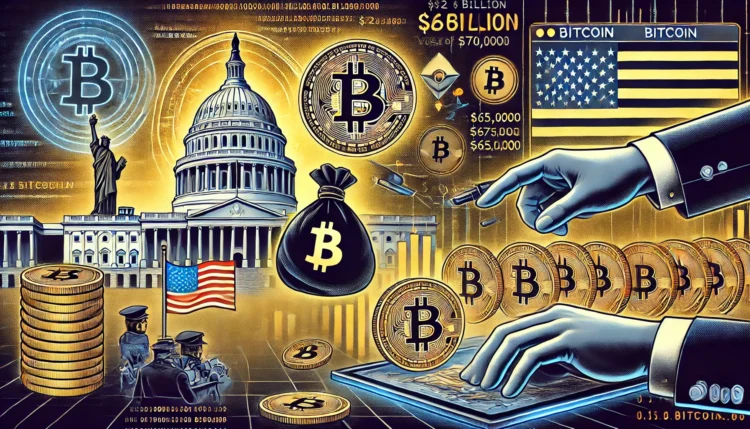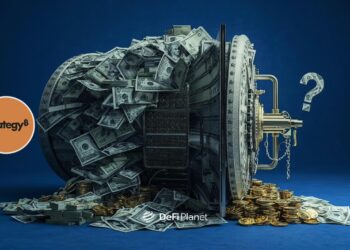The U.S. government, already one of the largest Bitcoin holders globally with over 200,000 coins, may soon significantly increase its holdings. A new bill introduced by Senator Cynthia Lummis (R-Wyo.) proposes creating a strategic Bitcoin reserve to reinforce the dollar’s status as the world’s reserve currency.

The government acquired its stash of Bitcoin through law enforcement actions; most of it was seized during investigations into criminal activities like drug trafficking and cybercrime. Lummis proposed not only keeping this stash but also growing it to one million Bitcoin.
What Does This Mean for the Crypto Market?
Lummis claimed that just as the U.S. maintains reserves in assets like gold and petroleum, Bitcoin should be included to bolster the country’s financial security and leadership in global finance. Her proposed bill outlines a plan to gradually buy over 800,000 Bitcoins and hold them for 20 years. The only allowed use is to pay off the national debt, a strategy designed to stabilize the reserve and prevent market disruptions.
If enacted, the proposed legislation would mark a significant shift in U.S. national reserve management and signal a new embrace of digital assets. This pioneering move could set a precedent for other governments and potentially impact the crypto market in several ways.
The most obvious impact would be the increased legitimacy conferred on Bitcoin. The cryptocurrency becomes more legitimate and appealing to institutions and investors. And in turn, the large-scale purchases that it will set up will also affect the market dynamics and most likely drive up demand and price.
But there are also some risks. If the government ever decides to sell off its Bitcoin reserve, it could flood the market with too much Bitcoin at once, causing prices to drop. This situation is similar to the worries about Bitcoin being sold from the failed Mt. Gox exchange, which is currently making market participants nervous.
The Bigger Question: Why Bitcoin?

A key question about Lummis’s proposal to create a Bitcoin reserve is why the U.S. would need such an asset. National reserves like the Strategic Petroleum Reserve (SPR) are designed to manage vital resources, such as oil, during emergencies or supply disruptions, helping to stabilize markets and ensure a steady supply of essential goods.
So, does Bitcoin deserve a similar reserve?
Bitcoin is often called “digital gold” because it’s seen as a potential store of value, much like gold. But there are limits to this comparison. Gold has been a trusted asset for thousands of years, backing up currencies and holding its value through various economic ups and downs. Bitcoin doesn’t yet have the same deep-rooted history or role in the global economy. So, right now, Bitcoin’s role doesn’t quite match up to the need for a reserve system like those used for traditional resources.
However, as more people and businesses have started using Bitcoin, its image as a safe and stable investment is growing. Similar to gold, Bitcoin is increasingly seen as a “safe haven” asset, especially during uncertain economic times. So, Lummis’s proposal could be an attempt to push the U.S. government to catch on to the new way of doing things.
What are Experts Saying?
The proposal has sparked debate among financial experts, with supporters and sceptics pointing out real concerns about the long-term consequences of such a move. While proponents see it as a forward-thinking approach to reinforcing America’s financial leadership, critics warn of potential risks and unintended consequences.
Cody Carbone, the Chief Policy Officer at the Digital Chamber, is all in on the proposed legislation to include Bitcoin in national reserves. He urged senators to support the bill and believes this move could help manage market ups and downs. Carbone points out that Bitcoin has shown its ability to bounce back quickly from market dips, proving it’s a strong and reliable asset. According to him, this resilience makes Bitcoin a solid candidate for long-term financial planning.
Not everyone is on board with the idea of a Bitcoin reserve, though. Dennis Kelleher, CEO of Better Markets, has been quite vocal in his opposition. In a conversation with The Block, he warned that the bill would inflate token prices and argued that Bitcoin has no strategic importance of assets like oil or gold.
Kelleher points out that even after 15 years, Bitcoin hasn’t found a practical use or delivered any significant social benefit. He dismisses it as mostly a tool for gambling and speculation, raising important questions about whether Bitcoin can truly serve a meaningful role in the financial system.
Wrapping Up
The proposal to create a U.S. government Bitcoin reserve is raising more questions than it answers. While it could signal a shift toward greater government involvement in the cryptocurrency world, it also highlights the ongoing uncertainties surrounding Bitcoin’s role in the global financial system.
However, one big question remains. It concerns the origins of the U.S. government’s Bitcoin holdings. Since Bitcoin works on a “whoever holds it owns it” basis, using these seized Bitcoins as a national reserve could spark debates on its legality and ethics. Senator Lummis would need to explain to Congress why turning these seized assets into a reserve is a good idea and address any concerns from experts and the public.
Disclaimer: This article is intended solely for informational purposes and should not be considered trading or investment advice. Nothing herein should be construed as financial, legal, or tax advice. Trading or investing in cryptocurrencies carries a considerable risk of financial loss. Always conduct due diligence.
If you would like to read more market analyses like this, visit DeFi Planet and follow us on Twitter, LinkedIn, Facebook, Instagram, and CoinMarketCap Community.
“Take control of your crypto portfolio with MARKETS PRO, DeFi Planet’s suite of analytics tools.”



















